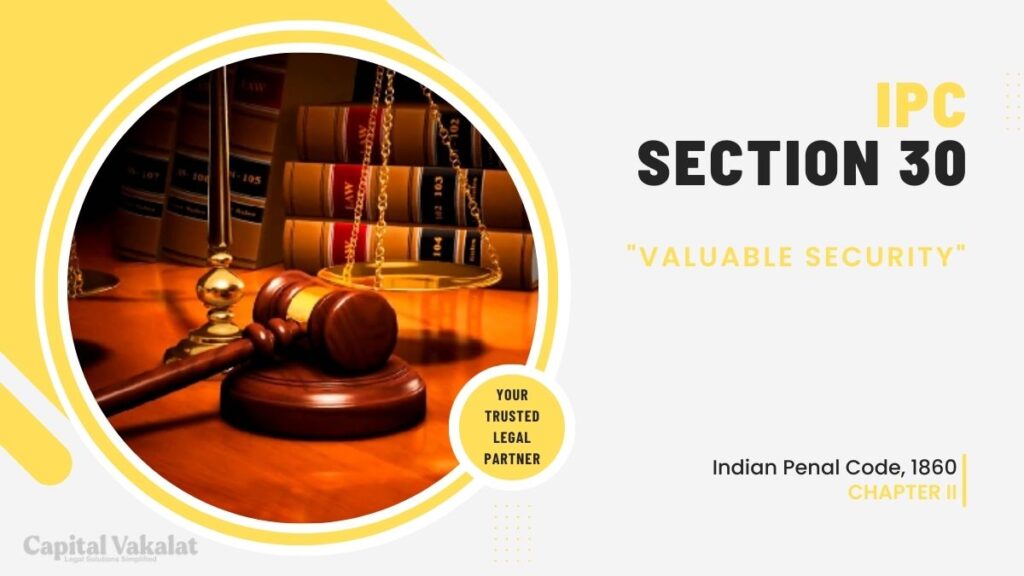In the realm of legal terminologies, Section 30 of the Indian Penal Code (IPC) holds a significant place due to its implication of the term “Valuable Security.” This legal provision plays a crucial role in defining certain types of transactions and obligations. Let’s delve into the intricacies of Section 30 IPC and gain a comprehensive understanding of what constitutes a valuable security.

Section 30 IPC is a provision within the Indian Penal Code that deals with the concept of “Valuable Security.” It serves as a fundamental element in legal transactions involving obligations, debts, and financial instruments. This section lays the groundwork for understanding the nature and implications of valuable securities in various contexts.
The Significance of Section 30 IPC
Section 30 holds significance as it clarifies the term “Valuable Security,” which is crucial for legal proceedings related to debts, contracts, and financial transactions. It ensures that parties involved in such transactions are aware of their rights and responsibilities.
Defining Valuable Security
A valuable security refers to any instrument that holds monetary value and can be exchanged, transferred, or used to fulfill an obligation. It includes promissory notes, bills of exchange, government bonds, and other negotiable instruments.
Forms of Valuable Security
Valuable securities manifest in diverse forms, ranging from tangible documents like bonds and certificates to electronic records and digital tokens in modern financial systems.
Characteristics of Valuable Security
A valuable security is characterized by its negotiability, transferability, and intrinsic value. These attributes distinguish it from ordinary contracts and make it a legally enforceable instrument.
Distinguishing Valuable Security from Other Instruments
Unlike ordinary contracts, valuable securities can be transferred from one party to another without altering the terms of the underlying obligation. This distinctiveness makes them a versatile tool in financial transactions.
Legality and Enforceability
Valuable securities hold legal validity and enforceability. They provide a legal framework for parties engaged in transactions, ensuring protection against breach of contract and default.
Cases and Precedents
Several legal cases have shaped the interpretation and application of Section 30 IPC. Landmark judgments have reinforced the importance of clear identification and documentation of valuable securities in legal disputes.
Regulations and Compliance
The creation, transfer, and discharge of valuable securities are regulated by various laws and regulations to maintain transparency and prevent misuse. Compliance with these regulations is essential to uphold the integrity of financial transactions.
Creating, Transferring, and Discharging Valuable Security
The process of creating, transferring, and discharging valuable securities involves adherence to specific legal procedures and documentation. These steps ensure the legality and authenticity of transactions.
Valuable Security in Financial Transactions
Valuable securities play a pivotal role in financial transactions such as loans, investments, and trading. They provide a sense of security to lenders and investors, enabling smoother economic activities.
Emerging Trends and Challenges
In the digital age, traditional valuable securities are being digitized, leading to increased efficiency and accessibility. However, this transition also presents challenges related to cybersecurity and authentication.
Protecting Against Fraud and Misuse
The digitization of valuable securities brings attention to the need for robust cybersecurity measures to prevent fraud, hacking, and unauthorized access to these financial instruments.
Impact on Business and Economy
The proper functioning of valuable securities influences the stability of the business environment and the overall economy. They facilitate capital flow, investment, and economic growth.
Conclusion
In conclusion, Section 30 IPC sheds light on the pivotal concept of “Valuable Security.” These instruments transcend paper and ink, holding immense value in financial and legal realms. Clear understanding and adherence to the principles outlined in this section are crucial for ensuring the integrity of transactions and the protection of parties’ rights.
Here are some external resources that provide further details about Section 30 IPC and the concept of “Valuable Security”:
- Section 30 IPC Explained: This article breaks down the provisions of Section 30 IPC and its relevance in legal transactions. Read more
- Investopedia – Valuable Securities Definition: Explore this detailed guide on what constitutes valuable securities, their types, and how they function in the financial world. Read more
- LawRato – Understanding IPC Section 30: Get insights into the nuances of Section 30 IPC and its impact on contracts and financial obligations. Read more
- Valuable Security and Legal Provisions: This comprehensive article elaborates on the legal aspects of valuable securities, citing relevant case law and interpretations. Read more
- Economic Times – Role of Valuable Securities in Economy: Learn about the role valuable securities play in shaping economic activities, investments, and growth. Read more
Feel free to explore these resources to deepen your understanding of Section 30 IPC and the concept of “Valuable Security.”
FAQs
Can valuable securities be transferred electronically?
Yes, with advancements in technology, valuable securities can be transferred electronically while adhering to legal procedures.
Are valuable securities limited to financial instruments?
While commonly associated with financial instruments, valuable securities can also encompass documents representing obligations and debts.
How do valuable securities contribute to the economy?
Valuable securities facilitate economic activities by promoting investments, enabling loans, and ensuring the flow of capital.
What challenges does the digitization of valuable securities pose?
Digitization enhances accessibility but also introduces cybersecurity challenges, demanding robust measures to prevent fraud and unauthorized access.